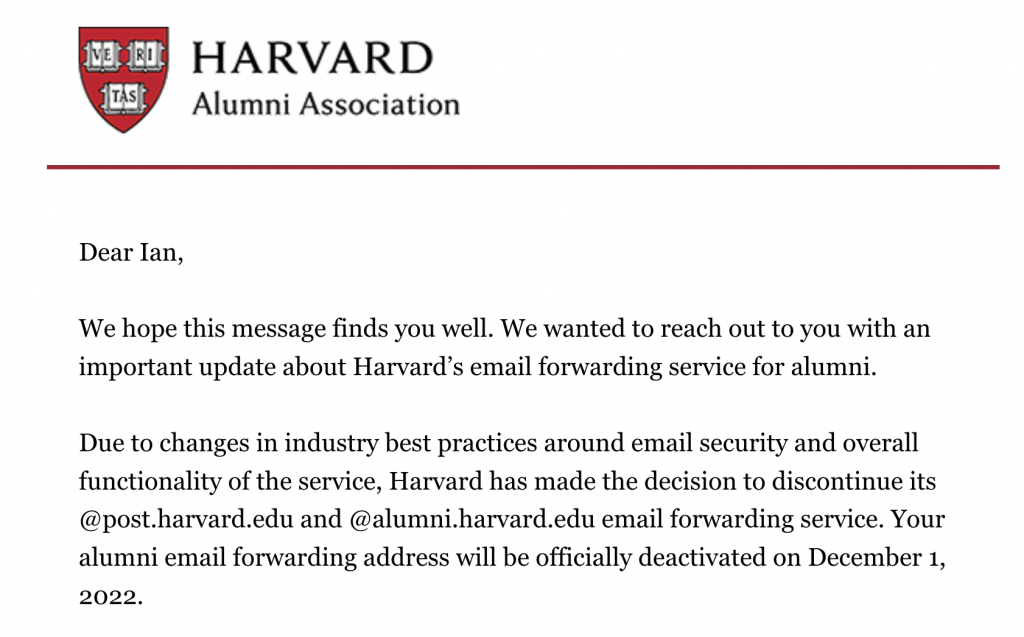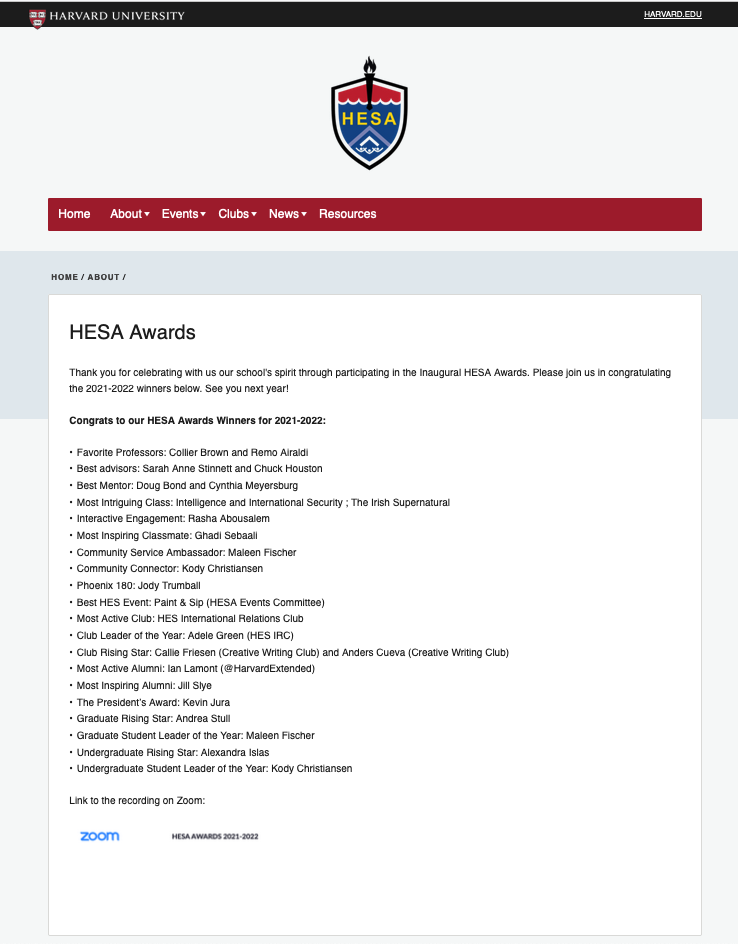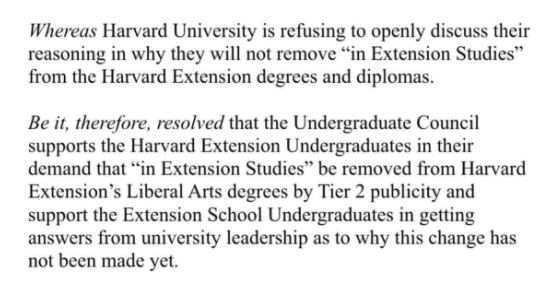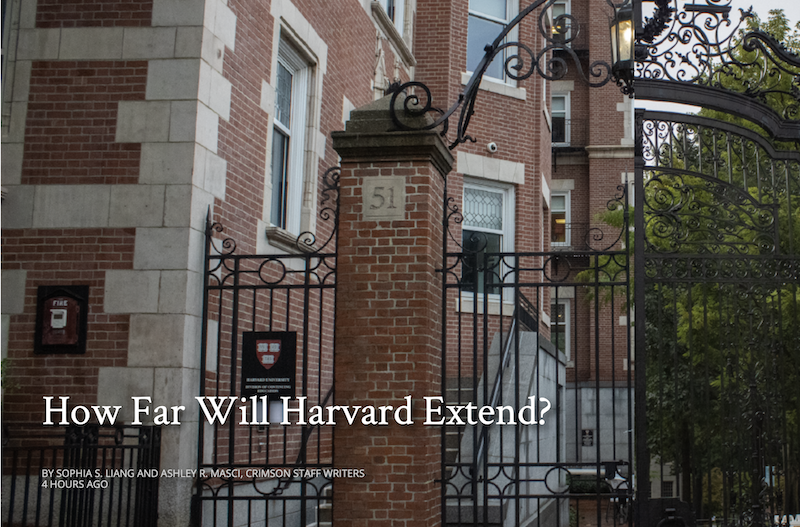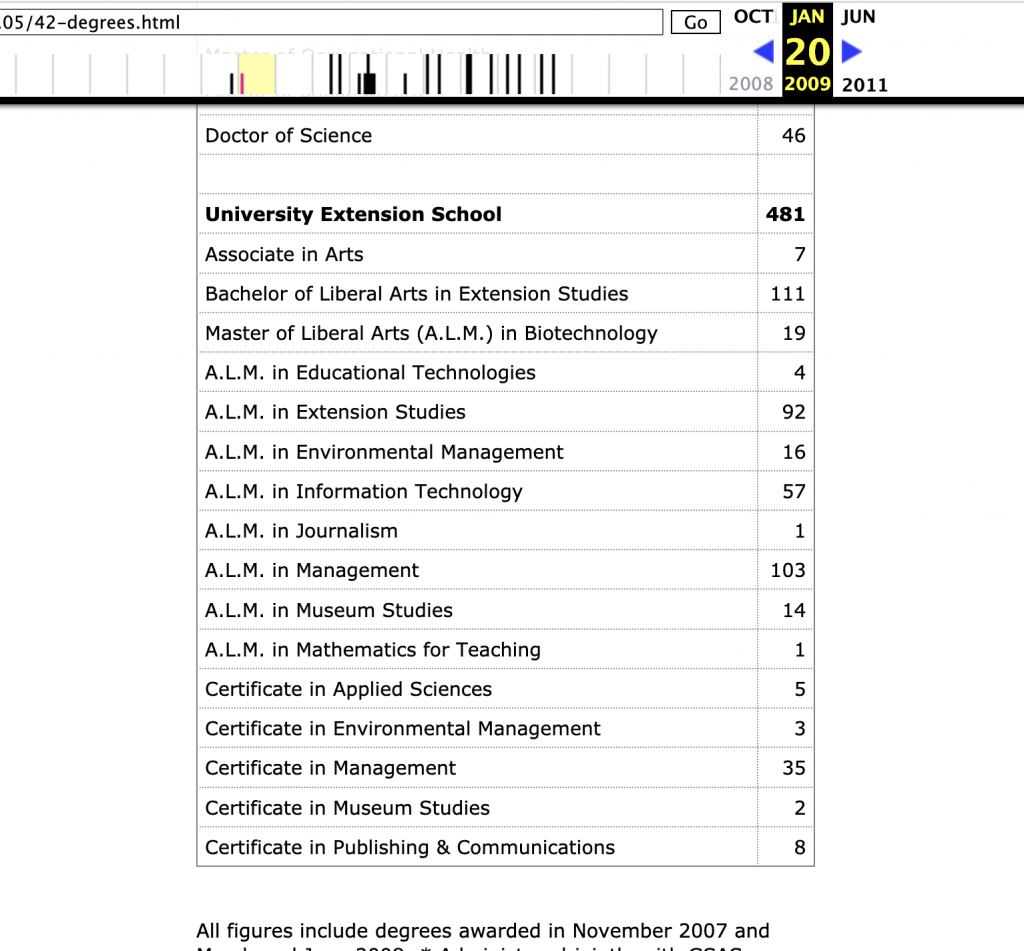I write a lot about the erosion of democracy in my hometown of Newton Massachusetts, but today I am going to switch things up and talk about the erosion of democracy at the Harvard Extension Student Association (HESA), the student government organization of the Harvard Extension School.
Bottom line up front: The Harvard Extension School has rigged HESA elections to exclude a certain activist from running this year, and will prevent other idealistic students from running for leadership positions in the future. As a student of modern Chinese history, it mirrors (on a far smaller scale) the abuse of democracy taking place right now in Hong Kong, in which Communist leaders in neighboring China rewrote the rules to eliminate activists and rivals and maintain political control (Quoting the New York Times: “New rules imposed by Beijing will make it nearly impossible for democracy advocates in the territory to run for chief executive or the legislature.”) It’s a terrible lesson for Harvard Extension School students, but is also yet another example of how HES students get second-class treatment that other Harvard schools would never impose on their own students.
Student government is not glamourous. There are no perks, leaders oftentimes find themselves criticized by students for not doing enough on certain issues, and school administrations tend not to take them very seriously. Nevertheless, groups like HESA are an opportunity for students to come together and work on issues that are important to the student body. For many, it is their first elected leadership role, experience that will serve them in their future careers or volunteer activities.
I never participated in HESA when I was a student at the Extension School. We had two young children at the time, and between home life, my full-time job, and my studies, I didn’t have the extra bandwidth. But I did vote in elections, and watched the organization under successive administrations.
Over the years, I have seen some fantastic HESA leaders and volunteers come and go. I have also seen a lot of drama. But nothing compared to what happened in the past month, in which Harvard Extension School administrators under the Dean of Students Office (DSO) and several staffers forced HESA to adopt a new set of election rules that effectively prevent new students from running for leadership positions.
This was clearly done to exclude a certain student activist from running for HESA President or Vice President or any board position. This student is the founder of the Extension Studies Removal Initiative, which seeks to remove the ridiculous and demeaning “in Extension Studies” designation from Harvard Extension School degrees. But the new Extension School rules, forced on HESA by the Harvard Extension DSO, will affect hundreds of other students in the years to come, disenfranchising a large segment of the Harvard Extension School student body.
Signs that something were amiss came in March with the news that the HESA president had abruptly left a few months before his term ended. No explanation was given. Then came the bombshell at the end of March that, just as the new HESA elections were getting started, a new set of eligibility rules were being instituted. Here’s what they said:
 Going through the highlighted sections above, the first shocker is ALB students (undergraduates) were excluded from running for HESA President. Note that almost all matriculated ALB students are working adults, including some who are older and have more life experience than their ALM (graduate) counterparts. A typical ALB academic profile is someone who is returning to school to complete a college undergraduate degree later in life.
Going through the highlighted sections above, the first shocker is ALB students (undergraduates) were excluded from running for HESA President. Note that almost all matriculated ALB students are working adults, including some who are older and have more life experience than their ALM (graduate) counterparts. A typical ALB academic profile is someone who is returning to school to complete a college undergraduate degree later in life.
The next point: Two full terms are required. Because the first rule says only admitted degree candidates can participate, this must mean two terms after matriculation, which requires completing three courses with a B or higher. Practically speaking, this means students would need to have at least three terms and at least five courses to participate in HESA elections.
This would be roughly analogous to the Harvard College Undergraduate Council suddenly announcing (at the direction of Harvard College administrators) that first year students are no longer eligible for the Executive Board, the central leadership org within the council. Currently, 3 of 5 Harvard UC EB members are from the class of 2024. Of course, there would be outrage from every first year student at the College if this were forced upon them.
The third point about not mirroring DCE organizational efforts can mean a few things. Before this year, I would have assumed it means HESA leaders can’t campaign on a platform to improve, say, online educational tools used for distance classes because that’s the bailiwick of the school itself. But I now think this line was inserted to specifically exclude the ESRI founder from running – because according to the DCE’s new dean, Nancy Coleman, removing “extension studies” from degrees is one of the goals of the Harvard Extension School.
The fourth point is clearly designed to prevent people like the ESRI leader – or a leader/board member of any other Harvard club – from concurrently serving in a HESA leadership role. It would be akin to the Harvard Law School suddenly declaring that leaders of Disability Law Students Association or Environmental Law Society couldn’t also run for elected representative positions in the Harvard Law School student government.
Keep in mind these HESA rules weren’t implemented by an inexperienced student leader who is vague on democratic concepts. It’s not even within the new HESA constitution or bylaws for HESA leaders to unilaterally rewrite the election rules. It came directly from the Dean of Students Office (DSO). When students pushed back, DSO walked back the rule against ALB students from running, but kept the other restrictions in place. Here is a screenshot from the DSO explaining the reasoning:
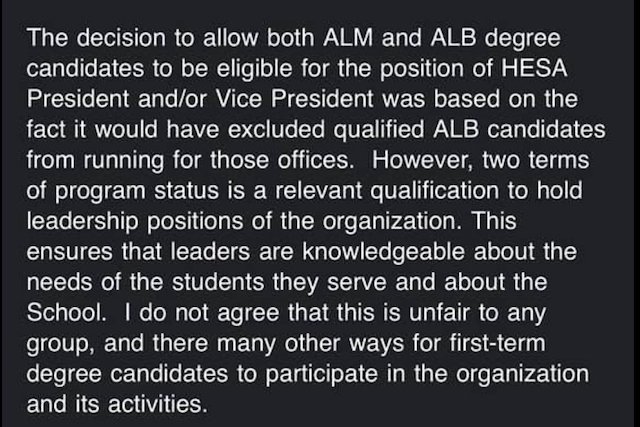
If ensuring “leaders are knowledgeable about the needs of the students they serve and about the School,” then by the same bizarre logic Dean Nancy Coleman and her predecessor Dean Huntington Lambert – both outsiders who had zero experience with the Harvard Extension School before being hired – should never have been tapped for leadership roles here. Similarly, if this is part of Harvard’s culture, then every school at Harvard – including Harvard College and the Harvard Law School – should have similar rules in place to keep out the inexperienced first-year students. Of course, only the Extension School does.
What the Extension School should immediately do is rescind these discriminatory eligibility rules for HESA leadership positions and reschedule a new election.
One final thing: In the course of researching this post, I discovered that the Harvard Extension School DSO Dean and at least one other DSO staff member are listed as Title IX coordinators at Harvard with responsibility for overseeing an important federal civil rights program that governs gender discrimination. I find it hard to believe that people who were assigned such important roles to protect the civil rights of Harvard students, can turn right around and deny the rights of Harvard students by rigging election roles to exclude an entire class of people from participating in elections for student government.
Update: The Harvard Extension School reached out to me after I contacted FAS to complain. The response:
Elections for leadership of the Harvard Extension Student Association (HESA) are student-run, and the Dean of Students Office (DSO) serves in an advisory role, only. Hence, changes made to this year’s eligibility requirements were not orchestrated by the School or the DSO, as you suggest.
This was immediately contradicted by more reporting from The Crimson, “Jura Wins Extension School Student Government Election, Commits to Transparency After Election Rules Dispute,” and statements made by HESA and DSO staffers:
Kenneth “Ken” Downey, Jr., the outgoing HESA director of communications, told The Crimson last week that the Extension School’s Dean of Students Office was responsible for the changes, though Division of Continuing Education spokesperson Harry J. Pierre has repeatedly denied the DSO was involved. … Downey Jr. said the Dean of Students Office was responsible for the changes and referred to statements made by [DSO staffer] Addison during a virtual “Meet the Board” event posted on HESA’s Facebook page on April 14. ‘HESA does not oversee any of the elections,’ Addison said during the event. ‘They [HESA] don’t make any decisions with regards to elections.’”
When multiple people – including DCE employees – are saying the same thing, backed up by a video clip and a detailed explanation from the DSO dean himself defending the new policies, I am strongly inclined to believe the evidence in front of me, rather than the spin from the Harvard Extension School.
Very disappointed in the Extension School and its officers.
